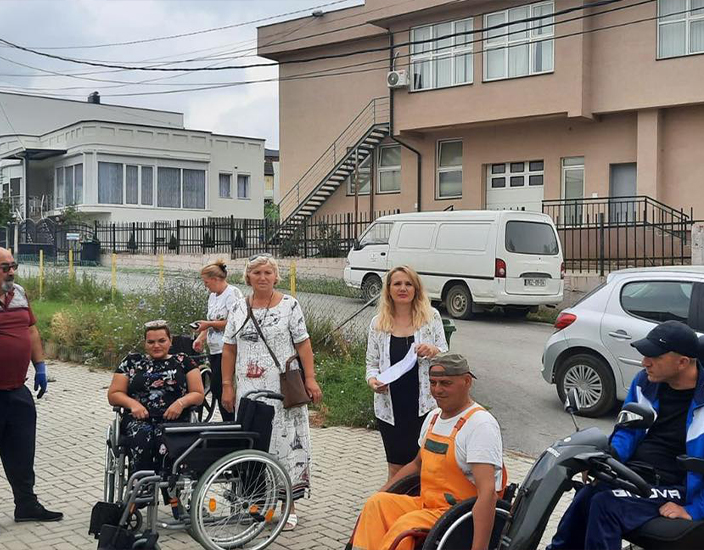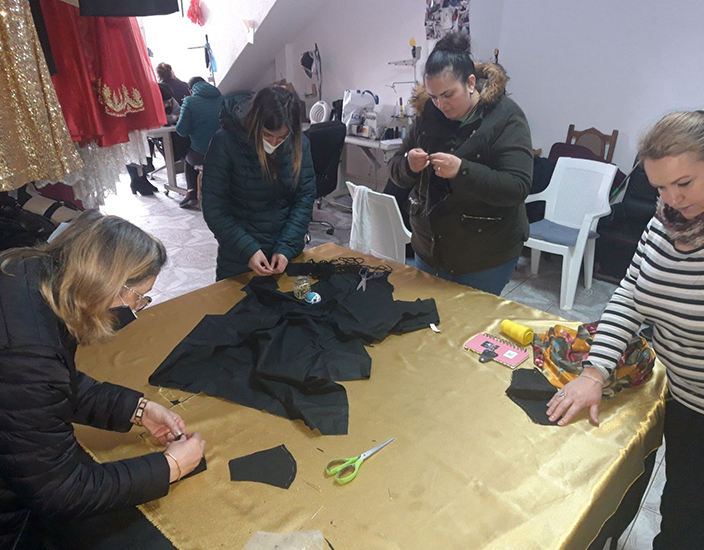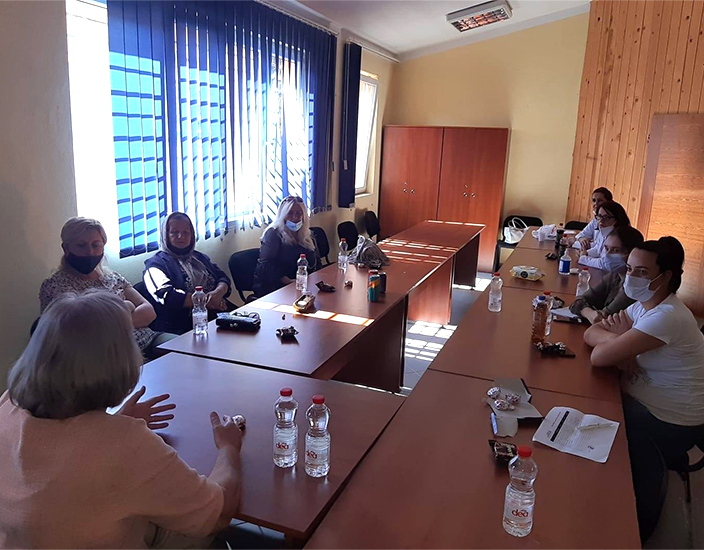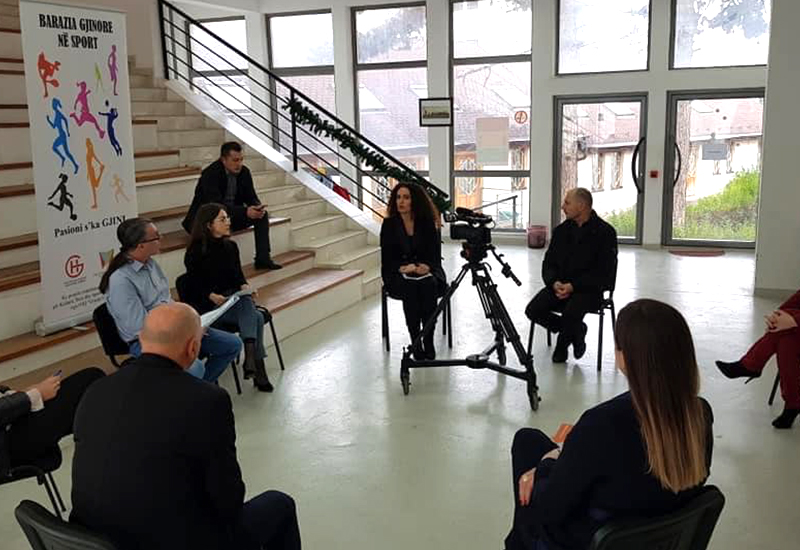Knowing well the challenges that women face within their community, NPO Gruaja Hyjnore (Divine Women) set out to educate women about their rights, empowering them economically by helping them gain their own sources of income.
Besides this, the mission of Divine Woman is to support and empower young people and advance the position of women in Kosovo society by raising awareness of their rights, gender equality, improving education and organizing social activities.
In an interview with Qëndresa Hajdari, project manager of this nonprofit organization, we discovered the most significant challenges they face, how they contribute to the development of philanthropy in Kosovo, and which activities they are the most focused on at the moment. Qëndresa also provided us with an example of their fundraising activities, that reflects their creative ways of activating their community.
How was your association established? What changed from the beginning to this day?
Qëndresa: Ms. Igballe Hajdari, who is now the director of the association, many years before creating this association, has individually worked hard (voluntarily) with women who needed social support, especially with the women of the Gjilan shelter, whom she has also helped develop professionally. Following this voluntary work of Ms. Igballe, the idea to create a nonprofit organization and work further and expand the activities and staff was born. In 2012, Ms. Igballe officially registered the association Divine Woman based in Gjilan, and with a small group of women volunteers, the work in this association has started. The organizational structure of the NGO Divine Woman consists of the assembly, the board of directors, the executive director, and the implementation team.
During the beginning of the association, the municipality supported us with an office, but later we were asked to leave it. Our first project was from the Ministry of Culture, Youth and Sports, entitled ‘Training women and girls for new skills’. Through these activities, women and girls were trained for professional development and independence. After the training, we held the mini-fair in the center of Gjilan, where these women had the opportunity to promote and sell the products they created for their own financial benefit. Although it was not a significant amount in material terms, the main purpose was to create the belief that after education and professional development follows employment or self-employment. Then, in the same year, we received another grant from Kosovo Women's Network, to empower women in the municipality of Gjilan. And so, from year to year, we have received various grants and continued working. What is different today is that we have managed to gain the trust of citizens, the municipality and various donors through activities and work that we are constantly doing.

NPO Divine Woman, in cooperation with the Directorate of Health of the Municipality of Gjilan, received a donation from the National Balkan-Egyptian Community "Piramida" in Austria, for direct support of people with disabilities: 25 wheelchairs for Handikos and health institutions, 20 assistive devices and 5 packages with different materials
What was your motivation to work in the nonprofit sector?
Qëndresa: Violation of human rights (gender inequality) and domestic violence have been the reasons that have given us the impulse to work in the nonprofit sector. The mission of the NGO Divine Woman is to create opportunities for individuals, the community and society in Gjilan, Anamorava and beyond, to claim their rights and develop economically. The vision of the NGO Divine Woman is to be a leader in supporting women's rights and promoting women's rights. The values of the NGO Divine Woman are socialization, cooperation, responsibility, trust, commitment.
How did the COVID-19 crisis affect the organization’s work? How much has the way you operate changed? What activities were you focused on recently?
Qëndresa: Initially, our activities were stopped just like the rest of the world. However, we continued work as restrictions were lifted but with extra caution. Usually, the activities were not in the same dynamics as before the pandemic, but we did not give up. We tried to continue the activities by adapting to the rules. Depending on the number of participants, we also held our meetings/activities online. Also, after the pandemic, we started to carry out many activities and promote them even more on social networks. We usually try to organize activities on essential days, be it one-day activities, whether a donor or volunteer supports them. We have recently focused on activities related to educating young people about health and sexual education.
Which activities are you most focused on at this moment?
Qëndresa: We are now focused on activities that deal with the sexual education of young people, seeing the latest instances of sexual harassment in educational institutions, on the streets, within the family or wherever they are. We are also focused on activities that aim to stop domestic or social violence, always based on the most frequent occurrences. Seeing the cases of violence that are increasing more and more, we are trying to raise awareness among the population through our activities to prevent sexual, physical, or even psychological violence that we encounter every day.
How is your association funded? Which types of donors do you work with the most, and how? How can someone support your work?
Qëndresa: As for fundraising, we are an organization that has about 90 members. Together with our members, we often raise funds or if not financially, help in other ways to organize planned activities for the benefit of the community.
Can you give us an example of your fundraising events?
One of the last activities that we have carried out with the help of our members has been the celebration of Children's Day - June 1st. For this day, we prepared different food, we were also supported with drinks (water and fruit juices), and we held this activity in the city center of Gjilan. We also invited children from the PEMA center (children with disabilities), along with the children who were present that day in the city center, as well as children from the RAE community, that had the opportunity to receive free food and drinks, thanks to the staff and members of our organization.
We as an association are strongly supported by the Kosovo Women's Network, the Ministry of Culture, Youth and Sports, the Municipality of Gjilan, ATRC / USAID, etc. We as an organization deal more with women's rights in property and inheritance, in education, in health, etc. We usually apply to all calls that suit our mission and vision. So far, we have worked on projects and with donors such as Youth and Human Security from the Ministry of Culture, Youth and Sports; Women's Empowerment in the Gjilan Region by the Kosovo Women's Network; Training of women and girls for new skills from MCYS; Addition of the subject Health Education in schools by KWN; Craft Fair supported by the Municipality of Gjilan - Department of Culture; Awareness for a better life - supported by the Global Albanians Foundation; An educated woman - a healthy society; Woman in 20 photos (March 8th); 16 Days of Activism Against Domestic Violence; Raising Citizens' Awareness on Women's Property Rights and Inheritance Supported by the Kosovo Women's Network and USAID / ATRC, and many more.

Cutting, sewing and handicrafts training within the project "Increasing women's access to employment"
How does your organization contribute to the development of philanthropy in Kosovo?
Qëndresa: Our organization has contributed to the development of philanthropy since before its creation. As I mentioned in the first question, before creating the organization, our director Igballe Hajdari, as a philanthropist, who dealt with women who were expelled from their houses where they were married and left on the street, without support, who were sheltered in the shelter of Gjilan, and with whom, she talked in a friendly manner, gave them space to talk to her as a friend. By invited them for coffee in her cafeteria and sharing knowledge from her craft (tailoring) — she helped women to socialize with each other and, at the same time to develop themselves professionally.
As an association, in addition to projects with financial support from various donors, we also organize various activities voluntarily to benefit citizens. We often hold activities with children with disabilities from the PEMA center in Gjilan. Usually, we try to organize the activities of June 1st - Children's Day together with this center. Also, within the last project that we have implemented voluntarily, in cooperation with the Directorate of Health of the Municipality of Gjilan we have received a donation from the Balkan-Egyptian National Community "Piramida" in Austria for the direct support of people with disabilities. Twenty-five wheelchairs for the disabled, 20 walking aids, and 5 packages with various accompanying materials for the disabled were distributed.
Do you cooperate with other nonprofit organizations? Can you tell us more about that?
Qëndresa: Yes, we cooperate with organizations with which we have the same goals. We have also collaborated with organizations outside the municipality of Gjilan. In addition to organizations, we also cooperate with various communities living in Kosovo. Usually, with the organizations we cooperate with, we carry out the same activities but in the municipalities that we operate since we have the same goals. This made our job easier and made us exchange information, which we also need for reports or statistics.

During activities with women and girls about the importance of reproductive health
We as an organization work with every person, regardless of background, gender, religion, political opinion, national or social background, economic/social status, sexual orientation, disability, etc. So, our projects are always with a purpose for the good of the community. We always involve the community in realizing our activities, and the community is always ready to support us as an organization in our civic initiatives. As an organization and as citizens, we try to be very active and organized. When we are organized as a community, the opportunities are more significant for the municipality to support us in our initiatives.
What are the biggest challenges you face?
Qëndresa: Our challenge as an NGO is that we do not have long-term financial sustainability from donors. Lacking long-term financial stability, we do not have the opportunity to keep staff at work all the time and we need to vacate the office we use for work and activities when we do not have projects. As for our volunteer work, we need to hold meetings with the staff in cafeterias or even at home.
What do you consider your greatest success and what is next?
Qëndresa: We consider our greatest success the connection we have established with the young people of our municipality, with whom we hope to make changes and achieve the goals we have as an association. Thanks to our unstoppable work, we also have messages from many citizens, organizations, and donors who compliment us on the work and activities. Our success is when our activities are really heard and our messages are conveyed to the citizens. We as an association are achieving our goals by becoming the voice of the citizens, while we will continue to work with various activities for the benefit of the citizens.


Leave a comment